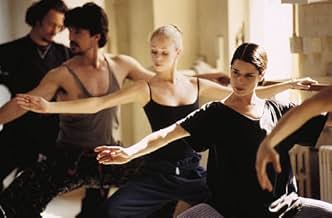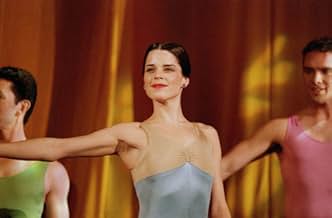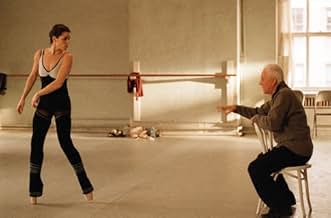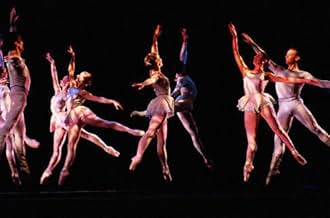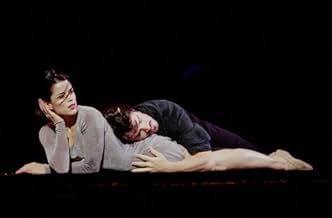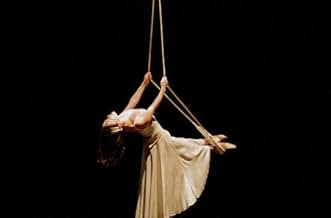PUNTUACIÓN EN IMDb
6,2/10
7 mil
TU PUNTUACIÓN
Añade un argumento en tu idiomaA young ballet dancer is poised to become the principal performer in a group of ballet dancers.A young ballet dancer is poised to become the principal performer in a group of ballet dancers.A young ballet dancer is poised to become the principal performer in a group of ballet dancers.
- Dirección
- Guión
- Reparto principal
- Premios
- 2 nominaciones en total
Barbara E. Robertson
- Harriet
- (as Barbara Robertson)
Davis C. Robertson
- Alec - Joffrey Dancer
- (as Davis Robertson)
Reseñas destacadas
Lets hope that Altman makes films for another 20 years and that he stays as adventuresome as he currently is.
In 'The Long Goodbye' Altman invented a rather new camera stance, literally asking the actors to improvise staging and having the camera discovering them.
It took a few decades for him to get back to such experiments with 'Gosford.' Now he takes it even further with perhaps the purest problem in film cinematography: how do you film dance?
Forget that this features Campbell in a vanity role: she is good enough and doesn't detract. Forget about any modicum of plot: there isn't any. And unlike 'Nashville' or the similarly selfreferential 'Player' there is no cynical commentary.
The commentary itself is selfreferential this time. Yes, this time the center of the film is how 'Mr A' orchestrates movement and images. This is most of all about himself, and is far, far more intelligent and subtle than say, 'Blowup.'
But along the way, you get possibly the best dance experience on film. That's because they've been able to use many cameras. There are not as many as 'Dancer in the Dark,' but each camera dances, engages with the dance and the dance of people and objects around the dance. So we get four layers of dance: the actual ballet, the orchestration of people around the production, the dancing cameras (enhanced by non-radical appearing radical editing) and the dance within the mind of Mr A who encourages, follows and captures them all.
Ted's Evaluation -- 3 of 3: Worth watching.
In 'The Long Goodbye' Altman invented a rather new camera stance, literally asking the actors to improvise staging and having the camera discovering them.
It took a few decades for him to get back to such experiments with 'Gosford.' Now he takes it even further with perhaps the purest problem in film cinematography: how do you film dance?
Forget that this features Campbell in a vanity role: she is good enough and doesn't detract. Forget about any modicum of plot: there isn't any. And unlike 'Nashville' or the similarly selfreferential 'Player' there is no cynical commentary.
The commentary itself is selfreferential this time. Yes, this time the center of the film is how 'Mr A' orchestrates movement and images. This is most of all about himself, and is far, far more intelligent and subtle than say, 'Blowup.'
But along the way, you get possibly the best dance experience on film. That's because they've been able to use many cameras. There are not as many as 'Dancer in the Dark,' but each camera dances, engages with the dance and the dance of people and objects around the dance. So we get four layers of dance: the actual ballet, the orchestration of people around the production, the dancing cameras (enhanced by non-radical appearing radical editing) and the dance within the mind of Mr A who encourages, follows and captures them all.
Ted's Evaluation -- 3 of 3: Worth watching.
Ugh. The problem with The Company is that it's not a Robert Altman film. His touch is evident in the filmmaking and fly-on-the-Wall feel of the movie, but it's not his movie. It's Neve Campbell's, who wrote, produced, and starred in it. Campbell spent years with the national ballet and this movie was a labor of that passion. However, that is precisely where it goes wrong. It shoots for the wrong audience. Dancers will likely love this movie but they are the choir. They know how a dance company works, the back dealing and politics. They don't need this movie. The rest of us don't learn anything, or at least learn just enough to know that professional dancing is a horrible way to live. The dancing was beautiful, including Neve's, although she doesn't look quite as polished as her back ups in the company, but the characters were shallow and you are never given anything to grab onto to care about any of them. The only ones you root for the ones who are injured or fired so they can get out of that horrible horrible place. Such a disappointment on so many levels. The only thing that does come off well is the Joffrey. You actually leave the theater wondering if the Ballet company underwrote the production as a marketing expense.
I love movies about dancers, but usually my favorites are a bit more sugarcoated than The Company. This one was a very refreshing change as it portrays dancers in a ballet company so realistically it feels like a documentary. Most of the actors are real dancers, and they don't act like there's a camera following them around. There are long scenes of rehearsals with bickering, silences followed by interrupted dialogue, mumbling, and dead time while we watch men and women stretching or putting on their shoes. If that sounds boring to you, stick with the Step Up franchise.
I really enjoyed The Company because of the realism. I knew Neve Campbell came from a ballet background, and I was very excited to see her showing off her hidden talents. James Franco does not, unfortunately, strap on a pair of flats and join in on the fun; instead he's Neve's boyfriend in the few scenes that show her enjoying her down time. Malcom MacDowell is the company director, and he's very believable as a passionate, demanding choreographer.
There's a scene that has stayed with me through the years: while rehearsing on stage as the performance grows nearer, a dreadful snap is heard, and one of the dancers collapses and cradles her leg. It's not drawn out dramatically or showcased in a closeup, and because of the lack of special attention, it feels so much more real and accidental. If you like ballet documentaries, or you really appreciate realism to the point of boredom, you might want to check out this movie.
I really enjoyed The Company because of the realism. I knew Neve Campbell came from a ballet background, and I was very excited to see her showing off her hidden talents. James Franco does not, unfortunately, strap on a pair of flats and join in on the fun; instead he's Neve's boyfriend in the few scenes that show her enjoying her down time. Malcom MacDowell is the company director, and he's very believable as a passionate, demanding choreographer.
There's a scene that has stayed with me through the years: while rehearsing on stage as the performance grows nearer, a dreadful snap is heard, and one of the dancers collapses and cradles her leg. It's not drawn out dramatically or showcased in a closeup, and because of the lack of special attention, it feels so much more real and accidental. If you like ballet documentaries, or you really appreciate realism to the point of boredom, you might want to check out this movie.
I suppose you can call this splendid movie a documentary showing several months in the life of the Joffrey Ballet of Chicago. However, as there are some dramatized elements (albeit to a minimum), you can't technically call it a documentary. And yet, it's more truthful than many "full" documentaries. Completely free from contamination of melodrama, the movie shows us, in a matter-of-fact manner, things behind the stage dedication and sacrifices, lucky breaks that even the top talents sometimes need, experienced performers arguing anainst new ideas, injury and understudy stepping in at a moment's notice, disappointment from being fired, and much more.
Doing what he does best, master Altman gives you an inconspicuous spot in the rehearsal hall, in the meeting room, back stage, to show you how an idea evolves right from an artist's concept to a successful performance the road that is sometimes painful, sometimes exhilarating and everything in between, the process that affects the lives of the people who are part of the whole. Overlapping dialogue here is not just Altman's artistic and technical trademark, but the way people REALLY speak. Through his amazing deployment of the camera, he also gives the audience a kaleidoscope of events and emotions that are fleeting and fluid, and yet remain with you long after the movie.
In addition to the insight of the documentary, dance lovers will enjoy the generous helping of dance scenes, particularly the outdoor performance in a thunder storm at the beginning. And although personal story is not the point of this movie, the depiction of the relationship between the characters played by Neve Campbell (the dancer) and James Franco (the chef) is wonderful. The scene of their first meeting is a joy to watch she is playing pool by herself and really enjoying it while he, a drink in hand, regards her somewhat stoically at a distance. The two of them are depicted in so many angles, sometimes in the same frame, sometimes separately. This scene is so mesmerizing that you'll forget the passage of time. At long last, they make eye contact and smile. Then, a cut to the next morning in her apartment when they are just waking up, as he offers to cook breakfast for them. An absolutely beautiful sequence.
Campbell and Franco are simply wonderful. The icon of the movie, however, is artistic director of the company Alberto Antonelli , generally known as "Mr A", who comes off larger than life with the flare of Malcolm McDowell, who undoubted is remembered best from "A clockwork orange".
To people who have experienced the joy of stage performance, even in a very modest way of an amateur choir or theatre group, there is the bonus of additional empathy the sometimes not so smooth rehearsals, the panic as the performance approaches and nothing seems to work, the last minute jitters before curtain, the final jubilation when everything miraculously falls into place and the sincere applause of the audience. Such empathy!
Doing what he does best, master Altman gives you an inconspicuous spot in the rehearsal hall, in the meeting room, back stage, to show you how an idea evolves right from an artist's concept to a successful performance the road that is sometimes painful, sometimes exhilarating and everything in between, the process that affects the lives of the people who are part of the whole. Overlapping dialogue here is not just Altman's artistic and technical trademark, but the way people REALLY speak. Through his amazing deployment of the camera, he also gives the audience a kaleidoscope of events and emotions that are fleeting and fluid, and yet remain with you long after the movie.
In addition to the insight of the documentary, dance lovers will enjoy the generous helping of dance scenes, particularly the outdoor performance in a thunder storm at the beginning. And although personal story is not the point of this movie, the depiction of the relationship between the characters played by Neve Campbell (the dancer) and James Franco (the chef) is wonderful. The scene of their first meeting is a joy to watch she is playing pool by herself and really enjoying it while he, a drink in hand, regards her somewhat stoically at a distance. The two of them are depicted in so many angles, sometimes in the same frame, sometimes separately. This scene is so mesmerizing that you'll forget the passage of time. At long last, they make eye contact and smile. Then, a cut to the next morning in her apartment when they are just waking up, as he offers to cook breakfast for them. An absolutely beautiful sequence.
Campbell and Franco are simply wonderful. The icon of the movie, however, is artistic director of the company Alberto Antonelli , generally known as "Mr A", who comes off larger than life with the flare of Malcolm McDowell, who undoubted is remembered best from "A clockwork orange".
To people who have experienced the joy of stage performance, even in a very modest way of an amateur choir or theatre group, there is the bonus of additional empathy the sometimes not so smooth rehearsals, the panic as the performance approaches and nothing seems to work, the last minute jitters before curtain, the final jubilation when everything miraculously falls into place and the sincere applause of the audience. Such empathy!
I'm no dance critic, but. . . I was very disappointed with the choice of "The Blue Snake" as the ultimate and climactic "number" in "The Company". To me, it really stood out as the least interesting and most cliched of all the dances in the film. Those outrageous costumes! That "Ice Capades" choreography! Altman & Co. really ought to have chosen a piece that would have shown the Joffrey's more adventuresome side.
I went into this film knowing that it was a "dance movie" with minimal storyline, and I was still disappointed. It's not a good sign when I start looking at my watch halfway through a film. It doesn't bother me that a "dance film" eschews the Melodrama of "The Turning Point" or "A Chorus Line." But "The Company" also eschews Interest! There was basically nothing to "hang onto" outside the dance sequences. Only Ry (Neve Campbell's character) was given any appreciable screentime, and aside from a few quiet moments, she wasn't given very much to do.
Okay, I admit that I liked one dramatic scene a lot: a flirtatious moment between Ry and Josh - the chef who looks like a male model - which takes place in a dive bar. There should have been more scenes like that.
I rate the film a 6 - dramatically disappointing, while the quality of the dance sequences varies from sublime to ridiculous.
I went into this film knowing that it was a "dance movie" with minimal storyline, and I was still disappointed. It's not a good sign when I start looking at my watch halfway through a film. It doesn't bother me that a "dance film" eschews the Melodrama of "The Turning Point" or "A Chorus Line." But "The Company" also eschews Interest! There was basically nothing to "hang onto" outside the dance sequences. Only Ry (Neve Campbell's character) was given any appreciable screentime, and aside from a few quiet moments, she wasn't given very much to do.
Okay, I admit that I liked one dramatic scene a lot: a flirtatious moment between Ry and Josh - the chef who looks like a male model - which takes place in a dive bar. There should have been more scenes like that.
I rate the film a 6 - dramatically disappointing, while the quality of the dance sequences varies from sublime to ridiculous.
¿Sabías que...?
- CuriosidadesNeve Campbell lost thousands of dollars of her own money to ensure that her fellow cast members received their wages.
- PifiasAt about 1:10 while counting during a rehearsal, Harriet skips the 6th count of 8.
- Citas
Alberto Antonelli: Ry, honey, let's scramble some ideas, instead of some asshole who contradicts me.
- Créditos adicionalesAfter the closing credits begin rolling, the dancers continue to take their final bows, and the audience continues to applaud.
Selecciones populares
Inicia sesión para calificar y añadir a tu lista para recibir recomendaciones personalizadas
- How long is The Company?Con tecnología de Alexa
Detalles
Taquilla
- Presupuesto
- 15.000.000 US$ (estimación)
- Recaudación en Estados Unidos y Canadá
- 2.283.914 US$
- Fin de semana de estreno en EE. UU. y Canadá
- 93.776 US$
- 28 dic 2003
- Recaudación en todo el mundo
- 6.415.017 US$
- Duración1 hora 52 minutos
- Color
- Mezcla de sonido
- Relación de aspecto
- 2.35 : 1
Contribuir a esta página
Sugerir un cambio o añadir el contenido que falta

Principal laguna de datos
By what name was The Company (2003) officially released in India in English?
Responde






